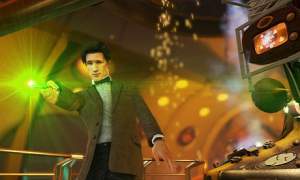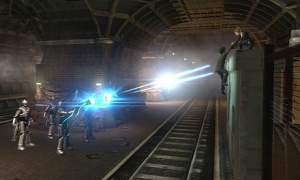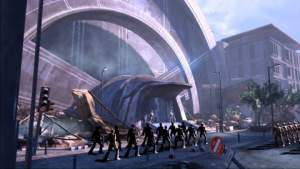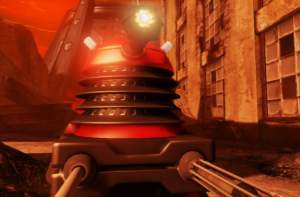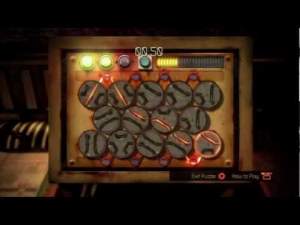His Review with Ian Abbott
Spanning five centuries in the capital of England town, the Doctor of Who and River of Song mosey through internal and external puzzle based environments, play with a vortex or two, alter time structures and events to effect change in the future and eventually make sure everything’s all right. Mix that with a Whovian wall of NPC fame that includes: The Cybermen, The Silence, The Silurians and The Original Big Daddy’s The Daleks and you’ve got a stonking good game, right? Not quite.
TV tie in alert! Beware the tie in!
The overall experience feels like a mediocre movie/game tie in (I’m thinking Thor). The game doesn’t pack the same punch or offer the repartee or joie de vivre of the original series and it also suffers from a little schizophrenia. What age and who is the game aimed at? Fans of the TV series, serious gamers, casual gamers? It’s too hard and repetitive for children, too boring for those competent gamers who would enjoy a decent platformer and too frustrating for a newcomer into either of the two worlds.
It made me want to stop playing with poor information design at several points throughout the game. Looking at this game with none Doctor Who fan glasses on, I was presented with a man and a chronic-sonic screwdriver as his main accessory who occasionally encounters a female companion who has hallucinogenic lipstick that temporarily stuns her enemies. There was no context, no introduction in any part of the game or any character and consequently I felt like I was floundering, trying to work out and piece together this hotch potch that was presented before. Should I know what Psychic Paper is or why there were lots of tally gates scratched into a wall? There’s a lot of fan-service going on here.
I remember the good times. There was the time when I had three rows of Cybermen plodding slowly along a tunnel where I had to constantly electrify three different sets of train tracks to keep them at bay. I remember infiltrating a Silence base keeping them them in sight whilst walking at a snail’s pace along high platforms and I remember all those time sensitive puzzles to complete before the Daleks shot their eye through my lady neck. Oh, they weren’t good times at all, not one bit; they were in fact dull and monotonous times, ironic in a game about time.
I didn’t understand why the world was presented in striking 3 dimensions (complete with genuine perspective and vanishing points) and yet the characters I controlled operated purely on a 2 dimensional axis – x and y. Did the Doctor live in a 2D world? I missed that episode. It left me with a massive sense of restriction and lack of freedom to move around or explore the well-lit and authentically textured world. I felt like I was operating in a snow globe, seeing only limited movements, which gave me a minute burst of pleasure, but fell flat quickly…and then I did the same thing again, and again, and again.
All of the environments and enemies encountered required only a miniscule adjustment in how I approached/defeated/evaded them to ensure progress. The majority of the environmental puzzle games fit into one of the following categories: 1) hide, wait and seek, 2) push a few crates around, 3) jump up, hang, drop and 4) rotate blocks/circles or match wavelengths. The various stealth portions were irritating, not because they were taxing and required Deus Ex precision, but because I was growing impatient at having to wait and wait and wait some more until the guard had passed by. In these moments, I’m not doing anything as the character, I’m being asked no questions or being challenged and consequently in this repeated formula I was cultivating my ever growing dislike for this game.
The one positive in the game was a huge filmic soundtrack (by the shows composer Murray Gold) with full orchestral support. It added a little bit of body to proceedings and helped to mask the thinness that surrounded the whole experience.
With little action, no context or guidance for most of the game and puzzles, a random set of hats to collect and some terrible AI from my companion, Doctor Who: The Eternity Clock is ultimately a restrictive and fumbling experience - which although voiced by Matt Smith - ultimately lets fans and gamers down alike by giving authenticity to neither group.
Her Review with Tracey
As the influence of games becomes more and more widespread, it was only a matter of time before a big corporation like the BBC embraced and tackled the genre. With no interest in retail or shipping, BBC Worldwide has partnered up with Sony to concentrate on bringing exclusive content to the Playstation Network. So is this a ‘get rich quick’ scheme or is there a thread of exciting quality that we can look forward to? Judging their first attempt, for me it’s not quite either but sadly there are serious flaws that clearly frustrated the hat off Ian.
Set in four different time periods across London, Doctor Who: The Eternity Clock is the first part of a promised story arc and features some iconic enemies from the series whilst Matt Smith puts in an energetically excellent performance as the Doctor. Working with River Song (voiced by an Alex Kingston that sounds more she’s reading a bedtime story to a primary school class than really creating a character), the Doc must regain pieces of the Eternity Clock from The Silence, the Silurians, the Cybermen and of course those pesky, vocoder masters the Daleks, each of whom want to harness the power of the Eternity Clock before it tears apart history. Collaborating with the production crew in Cardiff where the TV series is filmed, building a full-size Tardis set for Matt to ad-lib, jump, fiddle and kiss his way around and using motion capture has helped bring an accuracy to the game as the Doctor scurries, responds and chatters away like fans would expect. The writing is sharp with a balance of intelligent sci-fi dialogue about time corridors and stasis fields with whimsical observations; “Ah, London 1852, racy table legs…” whilst the soundtrack perfectly builds tension during timed puzzles, conveys dark underground tones from the past or pulsing rhythms of the future though without ever becoming intrusive or annoying when repeated.
This game is predominately aimed at fans and is in keeping with the aesthetics of the modern Dr Who brand. Yes okay Ian, newcomers to the franchise may struggle with leaping straight into the story or action and won’t care one particle about why historically they are fighting whom without having invested in the characters via the TV but I think to compare it to Thor or even Harry Potter is giving it a disservice as at least there is an attempt here to make it look good, sound good and it doesn’t shirk on complex storytelling but it’s nowhere near the same polish and inventiveness as Tintin or Rayman. This game need to see a doctor.
Surprisingly, time travel has never been tackled in other Dr Who videogames to date yet despite having the whole universe and history at their disposal, the developers have chosen to stick with the London location throughout in order to create a familiar, accessible and coherent plot though promise the next instalment will be off Earth. This does make sense and they make the most of it with some impressive landscapes but for me it’s a missed opportunity to engage from the off with the series mature fanbase. Catering for such a vast range of ages to try and cater for, it seems has meant some parts suffer from being too easy for mature gamers or too difficult for young gamers and overall, it doesn’t quite warp from ‘ok’ to ‘wow!’ There are three difficulty settings but this relates to how long you have to spend on each puzzle rather than how tricky the overall game can be. By having four enemies stretched over such vast periods of time, any level of threat and excitement is weakened; the approaching mechanical army of Cybermen (who still look like men in costumes, even in the game) or the lethargic whispering Silence don’t have the same impact with restricted camera views and direction restricted due to the 2D platform format whilst the issue of death is glossed over with no agonising final words, blood (or alien goopy equivalent) and consequence as fallen baddies very quickly evaporate to nothing. Of course not all games need a high gore factor to be successful but with little action, the game should look to its puzzles for strength, as in the Professor Layton series on the Nintendo DS but away from the quickly solved security panel knob twiddling braintwitchers or Time Corridor twisting sections, the rest of the game is nothing more than a short exercise in moving from A to B via C. Some levels are more than a test of patience as the distance between auto-save points is agonising, resulting in repeating long, monotonous scenes which in a modern game is unforgivable, particularly when the clumsy, glitchy AI keeps breaking the momentum.
The final showdown summed it all up where the Doc must frantically figure out some puzzles (get a ball in a hole, stop a ball going in another hole) before the action flips to River Song who is required to run and blast a power shot in order to protect the Doc but whose crabby weapons takes such a long time to charge up (which can only be done when standing still or walking slowly) that by the time she’s in position ready to take a pop, the enemy is in full swing and destroys the Doctor who then has to repeat said puzzles. It’s groan-inducing and ultimately feels like a waste of time. Ironically, I found that not getting the Time Lord’s timing right to the split second meant there was little chance of success whilst standing around waiting for things to happen was equally numbing. A game about time travel has the potential to be fun but restricting the player’s own rhythm, enforcing unnecessary pace and discipline and creating crazy difficult conditions in order to progress through some sections distracts away from the small enjoyment there is to be had with the subject matter.
We’ve played on the Vita and the PS3, both are the same price and look/feel identical. So if you suck at puzzles, hate being patient, are not sure who this Doctor bloke is and think studded flying dustbins with robotic voices and an eyeball on a stick are not scary; then this isn’t for you. Fans of the franchise will find much joy in Matt’s skilful performance of the Doctor which translates well into pixels whilst younger players should find the swivelling puzzles and screwdriver waving satisfying and engaging enough. A little less conversation, a little more action please and this series could really be worth investing time into but for now, I’m not leaving the Tardis as there’s not much to look at outside.
Doctor Who: The Eternity Clock is out now for Playstation 3 and Playstation Vita via the Playstation Network. PEGI 12
